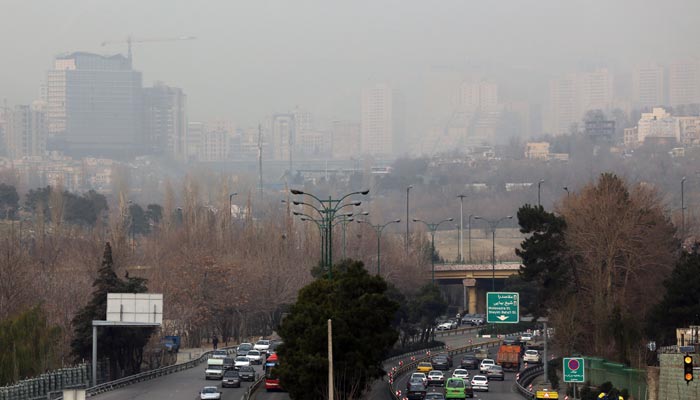The heavily polluted skyline of the Iranian capital is pictured on Saturday.
AFP/Tehran
Iran is to close schools for two days in Tehran, an official said on Saturday, following air pollution three times the acceptable level that has blanketed the city in smog.
Air quality in Iran's capital was the worst for at least nine months this week, media said, and airborne particles from car emissions were at "seven times the standard level".
"All schools will be closed on Sunday in Tehran and in the... towns of Shahr-Rey and Islam-Shahr (both south of the capital)," said environment official Mohammad Hadi Heydarzadeh.
"If the pollution continues, schools will also be closed on Monday," he said on state television.
Traffic will be limited in the city centre and some factories will be closed, media reported.
The official Irna news agency said that schools will also shut in Alborz province, west of Tehran.
Authorities have asked state employers to grant mothers time off to look after children who will be unable to go to school and urged the elderly, children and sick people to avoid going outdoors.
Emergency services have also been mobilised.
In December 2014, almost 400 people were hospitalised with heart and respiratory problems caused by heavy pollution in Tehran, with nearly 1,500 others requiring treatment.
The Air Quality Index on Monday showed an average reading of 162 - a "red status" warning that the air is unhealthy for everyone, according to World Health Organisation standards.
On Saturday it had dropped slightly to 148, still well above the normal healthy level of between zero and 50.
Peak pollution hit 180 in some areas of Tehran, where poor air is worsened due to high altitudes - between 1,100 and 1,700 metres above sea level - in a basin surrounded by mountains.
'We cannot breathe'
Visibility was low on Saturday as a grey fog blanketed the capital, a megacity of an estimated 14mn people, and authorities said they expect pollution to worsen in the coming days.
Exhaust fumes from 5mn cars and almost as many motorcycles that ply Tehran's roads each day make up 80% of its pollution, which increases in winter as emissions fail to rise above cold air.
"We cannot breathe. My eyes are itchy and my head hurts," said a taxi driver who only gave his first name, Khosro.
"Traffic is getting worse each day, it is stifling. It is like there is a grey haze hanging over the city. We can't see the mountains," he said referring to the snow-capped Alborz range that overlooks Tehran.
Iran's government has tried to cut pollution by supplying lower emission fuel in large cities, Masoumeh Ebtekar, a vice president responsible for environmental protection, said this week.
In 2012, pollution contributed to the premature deaths of 4,500 people in Tehran and about 80,000 in the country, the health ministry said.
According to the office in charge of monitoring air quality, the air in Tehran was "pure for only 219 days" during the past 16 years.

